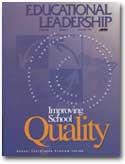Every so often a fresh idea fires our enthusiasm: team teaching, learning styles, thinking skills, interdisciplinary curriculum, cooperative learning, authentic assessment. The most recent is Quality, often called Total Quality Management (TQM). Trying to understand this latest movement, we ask, “Is it really different? Will it have lasting impact? What does it mean in practice?”
The basic values of the Quality movement, represented in the work of W. Edwards Deming, are hardly novel to educators. Our professional literature is filled with tributes to cooperation rather than competition, intrinsic rather than extrinsic rewards, and supervision as helping people instead of evaluating them. Our practices, though, are quite another matter. As Deming is quick to point out, most schools depend heavily on comparative marking, grade point averages, and so on. We're like people who go to church or synagogue week after week to hear how they ought to behave, but continue to lie and cheat in “the real world.”
Of course, educators aren't completely free to follow their professional consciences; they are required to adhere to policies and procedures established by state legislators and school boards, and they feel obliged to meet expectations of parents and other community members. Until now, business people, politicians, and the general public have demanded that schools use practices thought to be effective in other organizations: management by objectives, rigorous individual appraisal, pay for performance—and their equivalents at the classroom level.
To the extent that these practices were imposed on education by outsiders, the Quality movement offers an interesting opportunity. Now enlightened corporations all over the world—patterning themselves after the enormously successful Japanese—are embracing the very ideas to which we have given lip service all along.
This issue has articles from educators in schools and school districts throughout the United States who are implementing TQM, many of them through collaborative relationships with businesses in their communities. For example, the Burlington, New Jersey, Public Schools are engaged in a two-year training and implementation effort supported by five corporations, including AT&T and Xerox (see Abernethy and Serfass, p. 14).
The eventual impact of this activity depends to a great extent on how well leaders internalize the values basic to Quality. Tom Peters (1992) cites research showing that 80 percent of TQM programs in the private sector produce no tangible benefits. That disappointing finding suggests that leaders of many of the organizations never got the message. They weren't prepared to change their basic attitudes; most were probably just looking for innovative management techniques by which to squeeze more productivity out of their workers.
Educators, on the other hand, claim to start with a set of values more in accord with what Deming calls “profound knowledge” (see “A Conversation with Enid Brown,” p. 28). Profound knowledge, as Deming defines it, is more extensive, of course; it also includes system theory and statistical concepts—which most of us don't know a lot about—but knowledge from psychology about what motivates people is fundamental. Perhaps with continued attention to what Deming and others are saying, more people will come to understand that far from being educationist fluff, this knowledge has the power to make all organizations more effective. If so, educators can help lead the way to higher quality—in schools and out.
